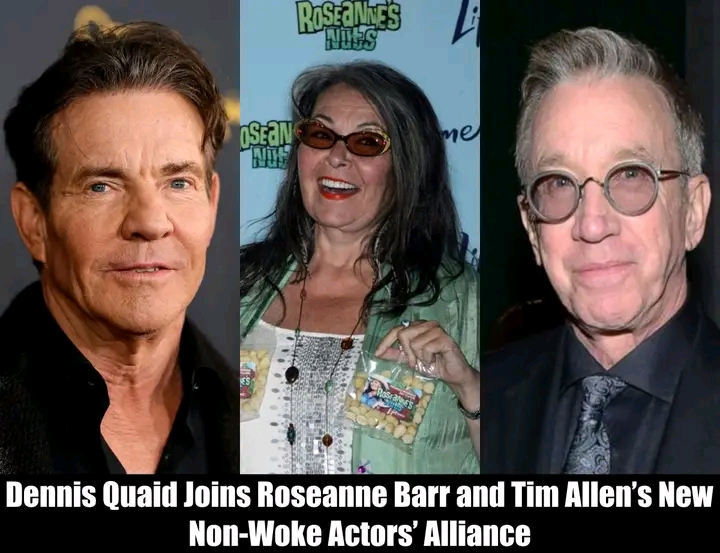CELEBRITY
Breaking: Dennis Quaid Joins Roseanne Barr and Tim Allen’s New Non-Woke Actors’ Alliance

In an era where the entertainment industry is frequently polarized by social and political ideologies, a new alliance is making headlines. Veteran actors Roseanne Barr and Tim Allen have launched a “Non-Woke Actors’ Alliance,” and their latest addition, Dennis Quaid, has added significant star power to the movement. This alliance aims to provide a platform for artists who feel marginalized by the current Hollywood culture, which they perceive as overly influenced by progressive agendas.
Roseanne Barr and Tim Allen, both well-known for their conservative views, have often found themselves at odds with mainstream Hollywood. Barr’s career took a notable hit after controversial tweets led to the cancellation of her successful reboot, “Roseanne.” Tim Allen, despite his success with “Last Man Standing,” has also been vocal about the challenges he faces in an industry that he believes does not welcome conservative viewpoints.
The idea for the Non-Woke Actors’ Alliance reportedly emerged from informal conversations between Barr and Allen. They shared their frustrations about what they see as a lack of diversity of thought in Hollywood. The alliance’s mission is to create a supportive community for actors, writers, directors, and other creatives who feel their perspectives are not represented or respected in the current entertainment landscape.
Dennis Quaid, an accomplished actor with a career spanning over four decades, is the latest high-profile figure to join this alliance. Known for his roles in films such as “The Right Stuff,” “The Parent Trap,” and “The Day After Tomorrow,” Quaid has built a reputation as a versatile and respected actor. His decision to join the Non-Woke Actors’ Alliance underscores the growing discontent among some Hollywood veterans.
In a recent interview, Quaid expressed his reasons for joining the alliance. “I’ve always believed in the importance of free speech and diversity of thought,” he said. “In recent years, it’s become increasingly difficult to voice any opinion that goes against the grain without facing backlash. I’m joining Roseanne and Tim because I believe in their mission to foster a more inclusive environment where all viewpoints can be heard and respected.”
The Non-Woke Actors’ Alliance aims to create an alternative space within Hollywood where conservative and moderate voices can flourish without fear of retribution. The alliance is not anti-progressive but rather pro-diversity of thought. Its founders believe that true inclusivity means welcoming a range of perspectives, including those that may be unpopular in the current cultural climate.
One of the primary goals of the alliance is to produce content that reflects a broader spectrum of viewpoints. Barr, Allen, and Quaid have already begun discussing potential projects that align with the alliance’s values. These projects aim to offer audiences stories that are not typically represented in mainstream media, focusing on themes such as personal responsibility, traditional values, and patriotism.
The formation of the Non-Woke Actors’ Alliance has sparked a wide range of reactions within the entertainment industry. Supporters applaud the initiative as a necessary step towards greater ideological diversity in Hollywood. They argue that the industry has become increasingly monolithic in its political leanings and that the alliance provides a much-needed counterbalance.
Critics, however, see the alliance as a regressive move that could deepen existing divisions within the industry. Some argue that the term “woke” is often used pejoratively to dismiss important social justice movements and that the alliance’s stance could undermine efforts to promote equality and inclusivity.
Despite the controversy, the alliance has gained significant attention and support from both industry insiders and the general public. Many believe that the current cultural climate in Hollywood has stifled creative expression and that the alliance could serve as a catalyst for change.
Looking ahead, the Non-Woke Actors’ Alliance has several projects in the pipeline. These include a new television series spearheaded by Tim Allen, which aims to blend comedy with social commentary from a conservative perspective. Roseanne Barr is working on a stand-up comedy special that addresses her experiences and viewpoints candidly. Dennis Quaid is in talks to produce and star in a feature film that explores themes of freedom and personal responsibility.
The alliance also plans to host events and workshops aimed at supporting and mentoring young artists who feel alienated by the prevailing cultural attitudes in Hollywood. These initiatives are designed to foster a more inclusive environment where different perspectives can be shared and celebrated.
The emergence of the Non-Woke Actors’ Alliance highlights a broader cultural shift within the entertainment industry. As societal and political divisions become more pronounced, the industry is increasingly reflecting these divides. The alliance represents a pushback against what its members see as an ideological monopoly in Hollywood.
While it remains to be seen how successful the alliance will be in achieving its goals, its formation is indicative of a growing desire for greater ideological diversity in the arts. By providing a platform for underrepresented viewpoints, the alliance could pave the way for more balanced and varied storytelling in film and television.
The Non-Woke Actors’ Alliance, led by Roseanne Barr, Tim Allen, and now joined by Dennis Quaid, is a bold response to what its members see as a pervasive culture of ideological conformity in Hollywood. By championing free speech and diversity of thought, the alliance aims to create a more inclusive environment for artists of all political persuasions.
As the alliance moves forward with its projects and initiatives, it will undoubtedly face both support and opposition. However, its existence alone is a testament to the growing demand for a more ideologically balanced entertainment industry. Whether or not it will succeed in reshaping Hollywood’s cultural landscape remains to be seen, but its impact on the ongoing conversation about diversity and inclusion in the arts is already significant












